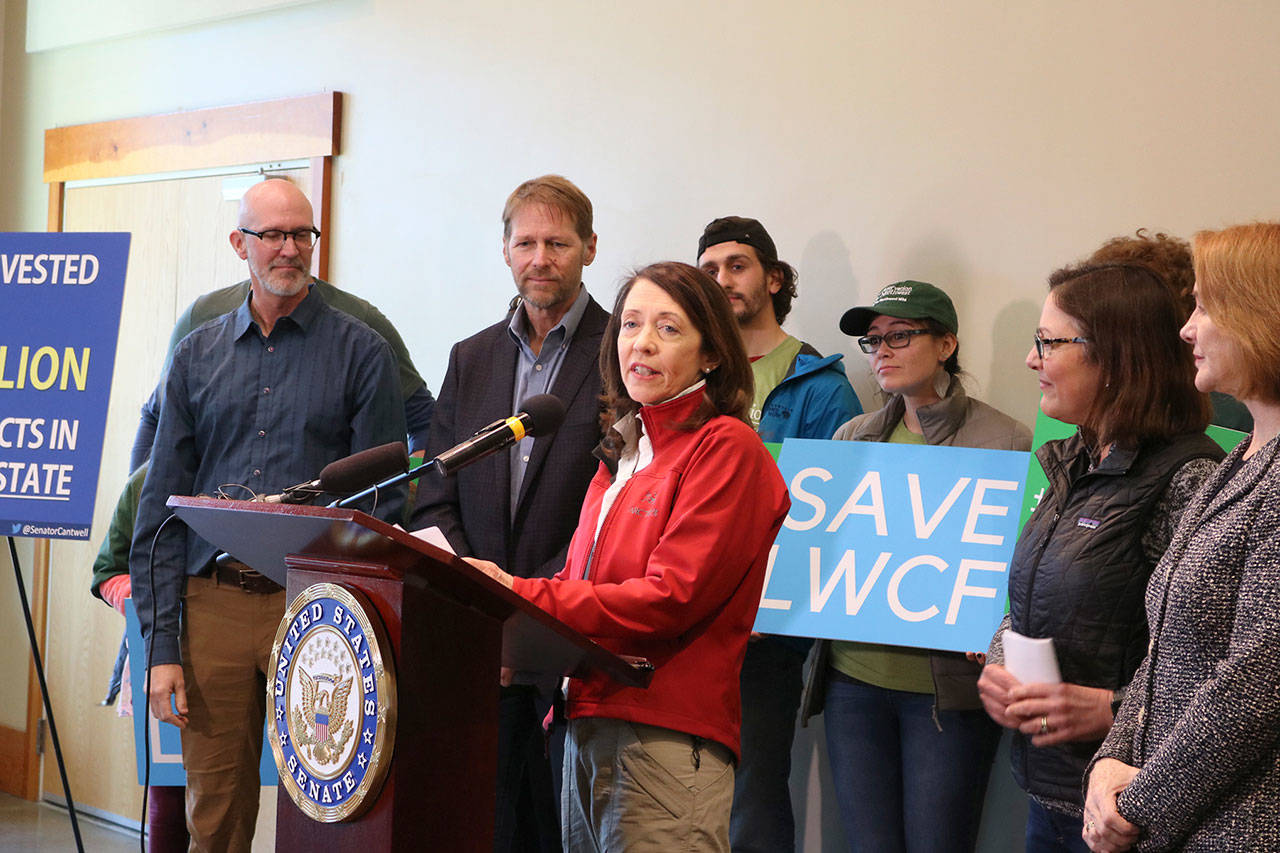Outdoor enthusiasts and public land advocates gathered on Feb. 21 in Sand Point to hear from Sen. Maria Cantwell and Congresswoman Suzan DelBene on the U.S. government’s plan to reauthorize the Land and Water Conservation Fund (LWCF), which has helped to preserve natural areas around the country and fund local park projects.
On the Eastside, LWCF grants have gone to Inspiration Playground in Bellevue, Marina Park in Kirkland, Saint Edward State Park in Kenmore and the North Creek Forest in Bothell.
The LWCF expired last September after a brief three-year extension in 2015. Cantwell has been working since then to secure funding for it, teaming up with Sen. Lisa Murkowski, a Republican from Alaska.
Their Senate bill (S. 47 — the Natural Resources Management Act, also known as the “Murkowski-Cantwell lands package”) was the largest bipartisan package of public lands bills assembled by Congress in more than a decade, and includes permanent reauthorization of the LWCF.
“It truly was a package of legislation, I think maybe from all 50 states,” Cantwell said. “There was a lot of land policy to work out, and I do think that is why we have a lot of support.”
It passed the Senate with a 92-8 vote on Feb. 12. The rally was held to encourage the House of Representatives to pass it as well, which they did on Feb. 26 with a vote of 363-62. The bill now heads to the president’s desk.
“There’s nothing better than just being outdoors, and it’s such an important part of our Northwest culture,” Cantwell said on Feb. 21. “Fighting to preserve it, and fighting to preserve this tool, has been a huge honor.”
DelBene applauded Cantwell for “addressing the need for preserving our natural environment and combating climate change,” noting that the bill had strong support in the Democrat-controlled House.
The LWCF has invested $675 million in more than 600 projects in Washington, including popular recreation sites like Olympic National Park, Lake Chelan, Gas Works Park and Riverside State Park.
Since being established by Sen. Scoop Jackson in 1965, the LWCF has become a key component of the outdoor recreation economy, which Cantwell said is now the third largest economy in the U.S., behind health care and finance. Outdoor recreation contributes $26 billion in annual spending and more than 200,000 direct jobs to Washington state.
The LWCF is a conservation tool that ensures states and federal public land management agencies are able to protect and conserve natural resources, by taking revenue from oil and gas royalties and directing them toward a fund that gives grants to federal, state and local conservation projects.
A statement from The Nature Conservancy recognized the LWCF as “the country’s most important conservation program, and it costs not one cent of taxpayer money.” The LWCF’s portion of offshore drilling fee revenues “is then used to conserve our country’s most beloved lands and waters – whether they are iconic landscapes or tiny neighborhood playgrounds,” according to the group.
“This approval was years in the making,” stated Mike Stevens, Washington state director for The Nature Conservancy. “The leadership and support of our state’s entire Congressional delegation shows that nature unites us. No matter who you are, or what you like to do outside, public lands are a vital part of our lives.”
The Nature Conservancy sent supporters to the rally, along with other organizations, including Conservation Northwest, the Wilderness Society, the Woodland Park Zoo, Washington Trails Association and more. Other speakers included Seattle Mayor Jenny Durkan, Outdoor Research CEO Dan Nordstrom, Tom Vogl of the Mountaineers and Jim Whittaker, the first American to ascend Mt. Everest.
“What’s more important to the planet than land and water?” Whittaker asked the crowd. “When you stand up high and there’s no life — no oxygen to support life — and you look at the planet, you realize, we’re so damned lucky to be here.”
DelBene said the LWCF has supported nautral areas in other parts of the 1st Congressional District, including Mount Baker/Snoqualmie National Forest, Ross Lake and the North Cascades. Durkan said the fund also helps more urban areas. It has contributed $72 million in matching grants for close-to-home parks and recreation.
“This will also help us in places like Discovery Park, South Lake Union Park… right here in Magnuson Park,” Durkan said. “We know you don’t have to get out of Seattle to enjoy the outdoors.”
The LWCF isn’t the only thing in Cantwell’s package that will affect her state. It will establish the Mountain to Sound National Heritage Area along the Interstate 90 corridor, opening up federal funding opportunities in the region. It will also address water challenges in the Yakima Valley, and make Washington’s Methow Valley permanently off-limits to industrial-scale mining and exploration.
“That’s why we fought so hard on telling the story of the economic value of the outdoor economy and building that coalition,” Cantwell said. “It was worth millions of dollars to preserve the recreational economy of Methow, more than a mining opportunity that would come and go in a very short period of time.”
The bill also will encourage the use of new technology for fighting wildfires, create a volcano early warning system and give Seattle’s Nordic Museum a national designation.
Megan Birzell, Washington State director of The Wilderness Society, stated that the “bill is bipartisan recognition of the importance of the outdoors and ensuring we all have access to places to play and explore.”
The funds will be used to “protect wild places,” as well as support “projects that can help address inequities in nearby parks and open space that currently exist for many communities, ensuring everyone can enjoy the outdoors,” she added.


